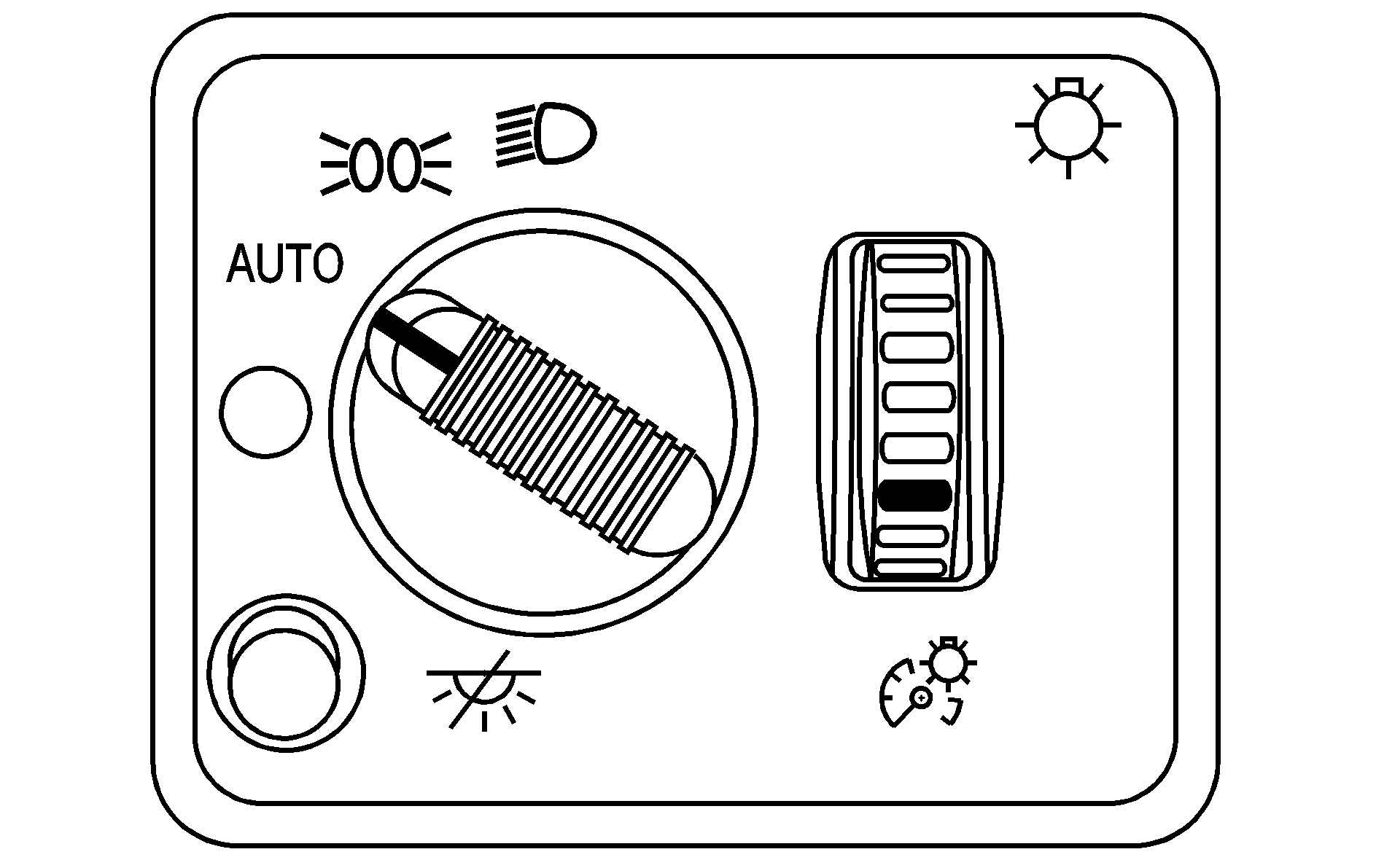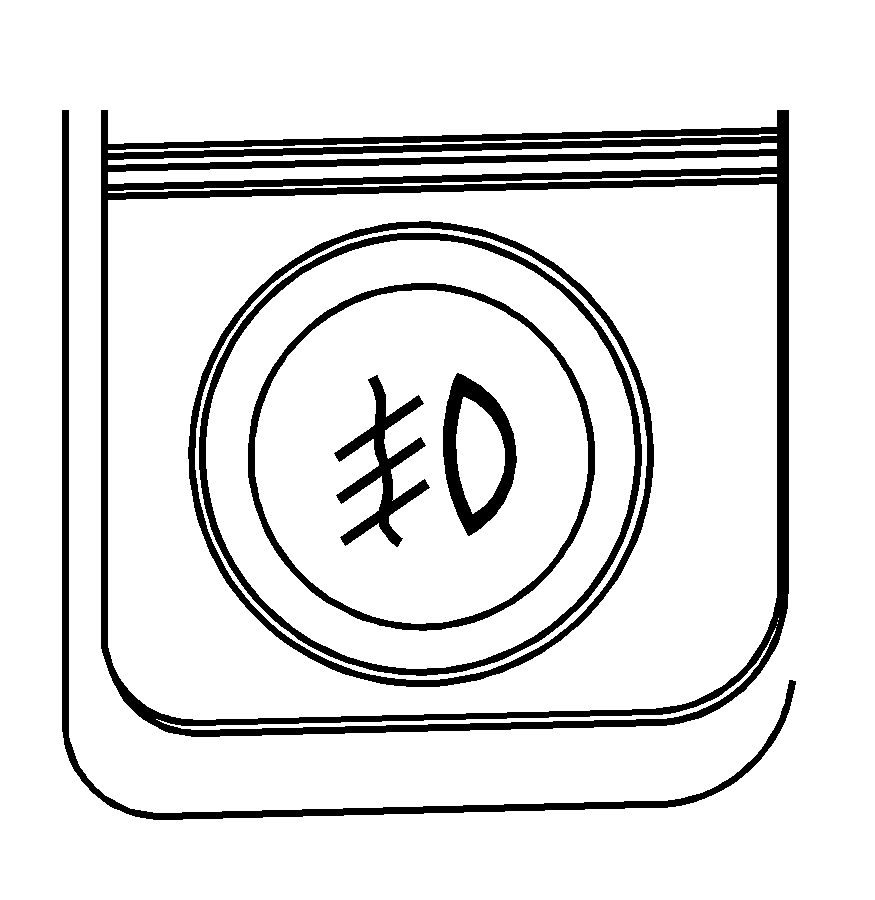
The control on the driver's side of your instrument panel operates the exterior lamps.
Turn the control clockwise to operate the lamps.
The exterior lamp control has four positions:
(Off): Turning the control to this position turns off the Daytime Running Lamps (DRL) and the automatic headlamps.AUTO (Automatic): Turning the control to this position puts the system into automatic headlamp mode.
(Parking Lamps): Turning the control to this position turns on the parking lamps, together with the following:
| • | Sidemarker Lamps |
| • | Taillamps |
| • | License Plate Lamps |
| • | Instrument Panel Lights |
| • | Roof Marker Lamps (If Equipped) |
You can switch your headlamps from high to low-beam by pushing the turn signal/high-beam lever towards the instrument panel.
A circuit breaker protects your headlamps. If you have an electrical overload, your headlamps will flicker on and off. Have your headlamp wiring checked right away if this happens.
Automatic Headlamp System
When it is dark enough outside, your automatic headlamp system will turn on your headlamps at the normal brightness along with other lamps such as the taillamps, sidemarker, parking lamps and the instrument panel lights. The radio lights will also be dim.
Your vehicle is equipped with a light sensor located on the top of the instrument panel in the defroster grille. Be sure it is not covered, or the system will be on whenever the ignition is on.
The system may also turn on your headlamps when driving through a parking garage, heavy overcast weather or a tunnel. This is normal.
There is a delay in the transition between the daytime and nighttime operation of the Daytime Running Lamps (DRL) and the automatic headlamp systems so that driving under bridges or bright overhead street lights does not affect the system. The DRL and automatic headlamp system will only be affected when the light sensor sees a change in lighting lasting longer than the delay.
If you start your vehicle in a dark garage, the automatic headlamp system will come on immediately. Once you leave the garage, it will take approximately one minute for the automatic headlamp system to change to DRL if it is bright enough outside. During that delay, your instrument panel cluster may not be as bright as usual. Make sure your instrument panel brightness control is in the full bright position. See "Instrument Panel Brightness Control" under Interior Lamps .
To idle your vehicle with the automatic headlamp system off, turn the control to the off position.
You may be able to turn off your Automatic Headlamp System. See "Daytime Running Lamps (DRL)" later in this section for more information.
Your headlamps will also stay on after you exit the vehicle. You can program this feature using the Driver Information Center. See Driver Information Center (DIC) .
As with any vehicle, you should turn on the regular headlamp system when you need them.
Lamps On Reminder
A reminder chime will sound when your headlamps or parking lamps are manually turned on and your ignition is off, in LOCK, ACCESSORY, or your door is open. To disable the chime, turn the light off then back on.
Daytime Running Lamps
Daytime Running Lamps (DRL) can make it easier for others to see the front of your vehicle during the day. DRL can be helpful in many different driving conditions, but they can be especially helpful in the short periods after dawn and before sunset. Fully functional daytime running lamps are required on all vehicles first sold in Canada.
The DRL system will come on when the following conditions are met:
| • | The ignition is on |
| • | The exterior lamps control is AUTO |
| • | The automatic transmission is not in PARK (P) |
| • | The light sensor determines it is daytime |
When the DRL are on, only your DRL lamps will be on. The taillamps, sidemarker and other lamps won't be on. The instrument panel won't be lit up either.
When it begins to get dark, the automatic headlamp system will switch from DRL to the headlamps or the last chosen headlamp setting that was used.
When you turn the headlamp switch off, the headlamps will go off, and your DRL lamps will illuminate, provided it is not dark outside.
Shifting the transmission into PARK (P) will allow you to idle the vehicle with the DRL off. The DRL will stay off until you shift the transmission out of PARK (P).
This procedure applies only to vehicles first sold in the United States.
Fog Lamps
If your vehicle has fog lamps, use them for better vision in foggy or misty conditions.

The fog lamp button is located on the left side of the instrument panel.
Your parking lamps and/or low-beam headlamps must be on for your fog lamps to work.
Press the button to turn the fog lamps on. Press the button again to turn them off. An indicator light will glow in the button when the fog lamps are on.
Remember, fog lamps alone will not give off as much light as your headlamps. Never use your fog lamps in the dark without turning on your headlamps.
The fog lamps will go off whenever your high-beam headlamps come on. When the high beams go off, the fog lamps will come on again.
The fog lamps will be cancelled after the ignition is turned off. If you still want to use the fog lamps after you restart the vehicle, you will need to press the fog lamp button again.
Auxiliary Roof Mounted Lamp Switch
If your vehicle has this feature, this switch includes wiring provisions for a dealer or a qualified service center to install an auxiliary roof lamp.

This switch is located on the center of the instrument panel near the comfort controls.
When the switch wiring is connected to an auxiliary roof mounted lamp, pressing the switch will activate the lamp and illuminate an indicator light near the switch. Pressing the switch again will turn off the roof mounted lamp.
